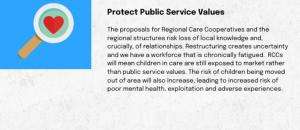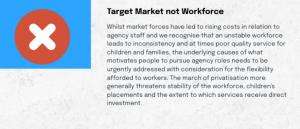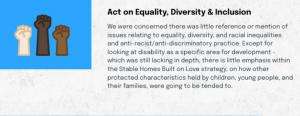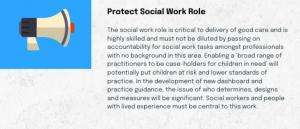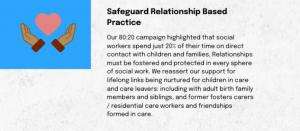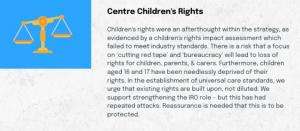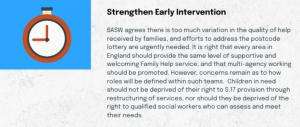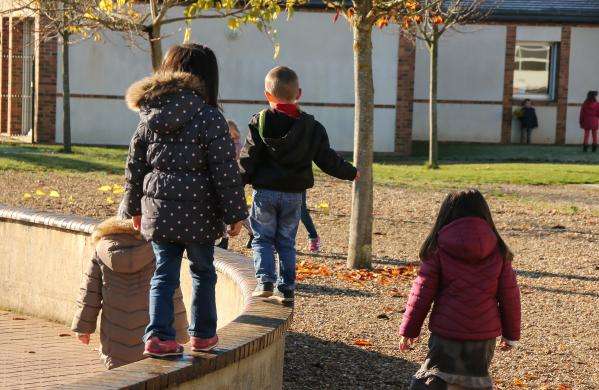
Overview
The Department for Education announced its Review of Children’s Social Care in England in January 2021.
The review aims to support the needs of England’s most vulnerable children, so they experience the benefits of a stable, loving home.
During the review, BASW England kept members informed of developments and supported them to respond to the consultation process, ensuring social worker's views and professional experiences were heard throughout. This included organising a number of online events to allow members to engage with the review and have the opportunity to provide feedback.
In May 2022, the Independent Review of Children's Social Care published its final report and recommendations. The full report is available to download below.
BASW England consulted with members on the findings of the final report, gathering views through a survey and engagement events. Read BASW England's full response to the report here.(August 2022)
In February 2023, the UK Government published its implementation strategy to fix children's social care in England: Stable Homes, Built on Love: Implementation Strategy and Consultation. The strategy is available to download on the link below.
BASW England consulted with members in response to the 3 Department of Education consultations (Stable Homes Built on Love, The Children’s Social Care National Framework and the Child and Family Social Worker Workforce) which ran simultaneously until May 23. Contributions to the consultations were gathered through member workshops, and direct input from members of the Children and Families Thematic Group
A combined summary of BASW England's response to the 3 afore mentioned consultations can be viewed in the infographic below.
BASW England's Response & Activity
2023
February
- Following on from the Government press release and our initial statement in response, the government has published Stable Homes, Built on Love: Implementation Strategy and Consultation, its implementation strategy to fix children's social care in England in response to the Independent Review of Children's Social Care. BASW England will publish a fuller response to the strategy shortly.
- The Department for Education issued a short press release in advance of the strategy being published, which you can read here.
- BASW England published an initial statement following the press release on the Government's Strategy for Children's Social Care.
June - BASW England response to DfE children’s social care implementation strategy
We would like to start with a huge thank you to everyone, who gave their time and knowledge in contributing to the DfE - Stable Homes Built on Love consultation, Workforce consultation and the National Framework consultation. For a brief overview of our responses to these three consultations, please see below.
BASW England response to DfE children’s social care implementation strategy
The following points are based on information collated by the BASW England team in response to the 3 DfE consultations which took in April/May 23. Contributions to the consultations were gathered through member workshops, and direct input from members of the Children and Families Thematic Group and thanks are offered to all those who took the time to contribute.
Stable Homes, Built on Love consultation – summary of BASW England’s response
BASW England stands by its previous statement upon publication of the strategy with our call for funding that reflects the reality of over a decade of funding constraints on Local Authorities. An allocation of just £200 million over two years, to 12 pathfinder areas falls short of the £2.6 billion outlined by the Independent Review of Children’s Social Care and doesn’t address the current chronic lack of resource at a national level.
We want to see immediate funding on a universal basis based on the wealth of evidence that already exists so that the crisis within the sector is tackled as opposed to targeted funding as part of the proposals pathfinder pilots.
The following bullets are a summary of some of the key points from our final submission to the consultation.
Key arguments from our response to the Stable Homes, Built on Love consultation:
- Significant investment is needed now, particularly as the children’s care system has been chronically underfunded and is now in more demand in the wake of the residual effects of the pandemic and the current cost of living crisis.
- The social work role is critical to delivery of good care and is highly skilled and must not be diluted by sharing safeguarding-specific tasks amongst professionals with limited or no background in this area.
- Whilst we support the approach of focusing on family networks, we believe this is already embedded in social work practice as seen with ‘Family Group Conferences’
- Retention of social workers is crucial: improving working conditions is key; for social workers to remain in their roles, caseloads must be lowered, supervision protected and promoted, more creative flexible working options provided, development opportunities readily provided, and support provided to those with caring responsibilities.
- Supporting children to remain with their families where possible aligns with the Children Act 1989, of which we are in full support. The act clearly lays out the necessary provisions enabling a family first culture.
- BASW agrees there is too much variation in the quality of help received by families, and efforts to address the postcode lottery are urgently needed. It is right that every area in England should provide the same level of supportive and welcoming Family Help service, and that multi-agency working should be promoted. However, concerns remain as to how roles will be defined within such teams. Children in need should not be deprived of their right to S.17 provision through restructuring of services, nor should they be deprived of the right to qualified social workers who can assess and meet their needs.
- We support the recommendations for a new legal definition of kinship care and are somewhat supportive of the working definition. We also welcome calls for legal aid extended to kinship carers, as well as a new kinship care leave entitlement. We also believe kinship carers should be given heightened priority for housing, dedicated benefits advisors who can help to maximise income, and access to no-cost training which meets their needs.
- With regards to the care experience, we are concerned with Missions 2 and 5 which fail to address the need for all children in care to receive care where they live.
- The government’s new inspection and regulation regime for semi-independent provision does not meet the ambition of providing young people in care and care leavers with ‘safe, suitable accommodation’.
- A third of 16 and 17-year-olds now live in semi-independent accommodation upon entering the care system. Under the new regulation and inspection regime, they may be forced to live in shared accommodation with vulnerable adults, or in bedsits without a door lock.
- Government should not spend £143 million on legitimising what was previously illegal accommodation, but to use the existing children’s homes regulations which would ensure all children receive the same level of care.
- The proposals for Regional Care Cooperatives and the regional structures risk loss of local knowledge and, crucially, of relationships. Restructuring creates uncertainty and we have a workforce that is chronically fatigued.
- With regards to existing corporate parenting principles, BASW believes that the basis for any changes must be rooted in what we already know and the experiences from of the children and young people, their family members or carers and the workforce that is accountable for delivering the full range of services.
- We reassert our support for lifelong links being nurtured: including with adult birth family members and siblings, and former fosters carers / residential care workers and friendships formed in care.
- We disagree that the proposals for addressing challenges in the system with regards to the workforce are sufficient.
- We agree with the aspiration that, “there is an excellent social worker for every child and family who needs one”. While we offer a qualified welcome to some of the proposals, we do believe that the proposals do not address the under investment in children services that would begin to address some of the factors that contribute to workforce instability.
- We welcome a more systematic approach to post qualifying social work training.
- We agree that the period post the ASYE is a particularly challenging time for many practitioners and therefore agree that a second developmental year would be helpful across children and adult services.
- We want to see an impact and evaluation of current ASYE programmes to explore what is or is not fit for purpose.
- The proposed Early Career Framework is planned to extend beyond the first 2 years to years 3 to 5. This further period would culminate in the social work attaining the status of “expert practitioner”. This seems to be a role that is synonymous with formal child protection roles and tasks and requires. We hope that such an “expert” role is available across the range of roles and activities in which child and families’ and adult social workers are engaged.
- Whilst BASW acknowledges that market forces have led to rising costs in relation to agency staff and we recognise that an unstable workforce leads to inconsistency and at times poor quality service for children and families, the underlying causes of what motivates people to work on agency contracts need to be urgently addressed with consideration for the flexibility afforded to workers.
- To help ease the stresses on the workforce, BASW reaffirms its calls for a national recruitment strategy to attract new social workers to the profession and to address retention issues by undertaking a review of working terms and conditions to ensure that social workers are supported throughout their careers and in the workplace.
- In order to support the education of new social workers an increased and equitable investment in a diverse range of educational routes is required and students need to be financially supported with wider access to bursaries which reflect the current cost of living.
- We were concerned there was little reference or mention of issues relating to equality, diversity, and racial inequalities and anti-racist practice. Except for looking at disability as a specific area for development, there is little emphasis within the Stable Homes Built on Love strategy, on how other protected characteristics held by children, young people, and their families, were going to be tended to.
- Our view of how the proposals would broadly impact children’s rights was negative and the changes broadly do not represent the best use of scarce resources in terms of funds and the social worker workforce.
- Concerns remain that there will be less access to fully qualified social workers for children in need in the community, including those harmed outside the home. RCCs will mean children in care are still exposed to market rather than public service values. BASW believes there is a risk that a focus on ‘cutting red tape’ and ‘bureaucracy’ will lead to loss of rights for children, parents, and carers.
- We support the strengthening of the IRO role – but this has had repeated attacks and reassurance is needed that this is to be protected and respected.
- BASW also opposes the creation of the new regulation and inspection regime for semi-independent accommodation.
Workforce consultation key messages:
- The increased demand and the operation of ‘market forces’ have led to rising costs in relation to agency staff and we recognise that an unstable workforce leads to inconsistency and at times poor quality service for children and families.
- We have concerns that implementing the proposed changes to agency staff, when the underlying causes of what motivates people to work on agency contracts haven’t been addressed, including organisational culture, cost of living, the need for flexibility and in some instances racism and bullying. Members cite the flexibility afforded to them via agency contracts as a key factor, for many with caring responsibilities the lack of flexible working options provided within many local authorities, do not provide them with the necessary level of flexibility.
- To implement restrictions, without addressing national pay scales and working conditions potentially risks experienced and valuable social workers who currently work via agencies, leaving the profession.
- Whilst we agree that social workers should be experienced prior to commencing in agency social work roles, we do not agree with the proposal that 5 years’ experience in a local authority is necessary or proportionate. We are additionally concerned that one of the rules suggests that paying agency social workers at an average of a substantive employee will not be equal to substantive post pay scales.
- We would suggest that work being undertaken via the various DfE and SWE working groups, looking at recruitment, retention and workloads needs to be concluded prior to the full implementation of most of these proposed National Standards.
- The proposal that local authorities would not engage agency workers within the same region for 3 months is “excessive” and we advocate that this restriction only be applied to the original employing local authority.
- Implementing these standards within the next 12 months, before addressing the issues relating to why social workers choose to leave or not to take up permanent roles, seriously risks destabilising a workforce which is already seriously depleted with 21% of social work posts in local authorities currently vacant (Children’s social work workforce, reporting year 2022).
National framework consultation key messages:
- We support the fundamental core principles that underpin children’s social care practice. However, there is a lack of reference in the proposals to ensure anti-racist, anti-oppressive and anti-discriminatory practice is integral to all of the core principles of practice.
- As part of our submission we suggested the following principles in addition to what was proposed:
- Practice and services are demonstrably rights based, child focused and adhere to international and domestic legal requirement
- Practice and services are resourced to deliver high quality standards underpinned by principles of equality, diversity and inclusion
- Effective multi-agency involved in the delivery of care need to be properly funded and accountable for the delivery of integrated and multi-agency services. This also needs to be sustainable.
- BASW strongly recommended that Education should be a key Safeguarding Partner in the last refresh of Working Together and we welcome the forthcoming consultation on Working Together.
- We noted a lack of reference to trauma-informed practice, managing contextual safeguarding risks, or digital risks to children, nor is there mention of complex issues such as disguised compliance, fabricated illness or gender issues and believe these areas should be covered.
- Clarity is needed as to how this guidance will fit in with existing measures such as the PCF, PQ, KSS and SWE standards. BASW believes that detailed prescriptions on ‘best practice’ or ‘practice handbooks’, should not be provided by government, but should be arrived at and reviewed by a partnership between DFE/DHSC, SWE, those who use services and their advocates, experienced registered social workers, supervisors, and educator/researchers.
- BASW is of the view that children under 18 are all children and must be entitled to the same level of care and provision regardless of their age and do not support the arbitrary categorisation into age groups.
- The proposed indicators are too narrowly framed and pay insufficient attention to the knowledge base on different ways of deciding on outcome measures and how to measure them. In particular they are overly-based on evaluating short term interventions rather than complex services that can impact on longer term wellbeing.
- There is confusion between the descriptive data that needs to be collected and the collection of normative data - with the risk of their inappropriate use as 'league tables'.
- The DfE proposals pay insufficient attention to the evidence already available from care-experienced people and their advocates about what would have helped them remain with their families or safely return to them (eg Article 39 research on impact of undetected abuse on older children entering care)
- When recommending outcome indicators, insufficient note is taken of the large volume of peer reviewed research on children and families recognised by the HEFCE Research Excellence Framework (REF) as of international excellence (see for example BJSW article https://doi.org/10.1093/bjsw/bcad116 and the Professors of Social Work Evidence Events https://apsw.org.uk/kee-recordings/ )
2022
May
Media coverage:
- Launch of national review into child deaths – BASW senior exec respond to the review into the tragic murders of Arthur Labinjo-Hughes and Star Hobson, including failings of social workers. Appearing on BBC News, ITV, Good Morning Britain and BBC Politics North, we addressed the failings but also covered the wider context of poverty, deteriorating working conditions, lack of resources and poor retention rates contributing to a poorer service in some areas.
Launch of Independent review into Childrens social care – BASW senior exec and members engaged with all the major TV outlets, including BBC News, ITV, Channel 4, Sky News, to comment on this ‘once-in-a-generation’ review. While the review requires a thorough on-going analysis, BASW’s initial reaction was to broadly welcome some of the aims of the review and calling for Government to match the funding set out.
BASW commented however, that the review doesn’t go far enough in tackling the wider context of poverty driving up demand on social services. We also queried many aspects of the review’s recommendations for certain social worker roles, as wells questioning whether implementation of the wider plan was realistic.
- Care system: Help families before they reach crisis, urges review - BASW widens the focus to look at how austerity years and poverty is driving up demand on social services
- Review proposals to ‘axe’ child protection conference chairs a ‘massive concern’, warns BASW - BASW warns about the loss of IRO's and the diluting of specific social worker roles
- PSW magazine: Children's social care review must make the link to poverty
August
Independent Review of Children's Social Care - BASW England full response
Our focus in this response, on behalf of our members, is on the implications for the social work profession, social workers, and on the potential impact on the children and families served by the profession.
2021
February
- BASW England writes to SoS for Education Gavin Williamson
Dear Secretary of State
Re: Independent Review of Children’s Social Care
The British Association of Social Workers (BASW) is the professional body for social workers with a membership of more than 21,000 members. We are the independent voice of social work.
Our professional members have significant collective experience of working with children in need, young people and families in England. We urge the government to revisit the terms of reference and to both defer the commencement of the Independent Review of Children’s Social Care and extend its timeframe.
For credibility and to make the major, positive change to the sector (which is stated as its ambition), a much more realistic timeframe is needed. One in which children, young people, families, social workers and other professionals and stakeholders can be truly engaged and involved.
The impact of the pandemic has had a major toll on children, families and those who support them. This is not the right time for the review and it certainly should not be rushed. Our members have also expressed concern about the review being chaired by one person, particularly a person without wide sector knowledge and leadership experience.
We would have expected the chair of a 'once in a generation' fundamental review of the children’s social care system to be someone who has publicly championed and advocated for those in the care system. Also to have substantial operational, strategic experience and qualifications for working with a wide breadth of different groups and services (wide sector knowledge).
A co-chairing arrangement and a transparently recruited, expert panel of recognised leaders would be much more credible and more likely to lead to success and sector wide confidence.
BASW UK has recently set out its principles for social work with children and families in our recently published ‘Vision for Social Work with Children and Families’. We have also set out a briefing from the BASW England Children and Families group on the Context, Roles and Tasks of Child and Family Social Workers in England. Reflecting these and the BASW Code of Ethics that should underpin all UK social work, we expect the government to: -
1. Defer, reframe or significantly extent the timeline - a realistic timescale for real improvement. The short timeframe, compounded by the COVID-19 pandemic, raises concerns as to how comprehensive the review will be. It is imperative to reflect the broad scope of the review and to ensure the process is not rushed, tokenistic and that it is transparent and inclusive. Our decades of experience tell us that 12-15 months is unrealistic for such a large-scale review unless the outcomes have already been agreed and the reform footprint developed. The timing of this review is not right, the pandemic continues to have a significant impact on the wellbeing of the workforce and the children, families and communities they support.
2. Reconsider the leadership of the review and appoint in a transparent way a co-chair and review panel to include social work expertise and familiarity with the necessary knowledge base. Members have expressed concern about the review being undertaken by a single person. We would have expected the chair of a 'once in a generation' fundamental review of the children’s social care system to be someone who has publicly championed and advocated for those in the care system and has substantial direct experience of and qualifications for working within the system. Concerns have also been raised as to the transparency of the process by which the chair of the review was appointed. In view of this, a co-chair with extensive experience and knowledge, and preferably with lived experience, should be appointed. The current chairing arrangement lacks insight.
3. Integrate lived experience of care and social work services at the heart of the review. For the review to be meaningfully co-produced, it should be led and designed for and by care experienced people. Care experienced people must be leaders within the review team, rather than peripheral players.
4. Ensure an anti-racist, anti-discriminatory and anti-oppressive approach. The voices of black and minoritized care experienced people simply must be central to a review which has such significant implications for their communities. Children, regardless of the deprivation level of their neighbourhood, which speaks volumes of structural inequality, must no longer be ignored. Furthermore, coronavirus has had devastating impacts on women’s rights across almost every sphere of life, and this must be recognised. In addition, the expert by experience group must be accessible to those requiring interpreters in the deaf community, those who speak English as a second language, those who need advocates and other additional methods. There must be an accessibility budget. The needs of those who are neurodivergent, or who have any complex or additional needs such as learning disability or other forms of disability must be supported and empowered to be able to contribute on an equal platform.
5. Tackle the impact of austerity, the role of poverty including food insecurity* and discrimination in family distress, risk and statutory intervention. The voices of children and young people with care experience and their families must be integral and at the heart of the review. Care experienced people must be paid for their time, to speak to the value of their contribution – this is non-negotiable. Additionally, engagement with families receiving care and support from children’s social care must also have a voice alongside the wider community the system serves. Food poverty should not be experienced by a child whose corporate parent is financially secure. The fact that children in care experience food insecurity* speaks to a failing of the children's social care system and requires attention. The impact of this failing is wide reaching, from affecting children's health and education, to undermining their confidence to build and sustain relationships. To ensure the independent review 'improves children and young people’s lives and outcomes at the earliest opportunity', achieving food security for all children in care needs to be a focus. (*Food insecurity defined as 'the lived experience of food poverty' at BASW 50th Festival 2020).
6. Uphold and strengthen children’s and family legal rights and reflecting the United Nations Convention of the Rights of the Child. A clear statement of commitment must be issued stating that the legal, safeguarding and wellbeing rights of children will be core to the review.
7. Offer transparency about membership of the review team and business support. There should be transparency and shared information of all members of the review team and the projected cost of the review.
8. Be independent of government - inclusive, transparent and accountable. For such a broad ranging review BASW England would expect registered social workers, support practitioners and leaders with extensive experience of children and family social work and social care to lead this review. The review needs to be independent of government, inclusive, transparent and accountable.
9. Involve practising social workers and BASW the professional association of social work throughout. BASW, child rights campaign groups and other organisations were not invited to the announcement launch event of the review. If the review is to be truly inclusive it must ensure the voices of all are heard, including the voices of people with lived experience, of social workers based on their experience, wisdom and the incredible work they do - day in day out across the country.
10. Diversify communication. Communication about the review must be diverse, not just Twitter (arguably elitist in that it is designed for professionals). Engaging through Instagram, Tiktok, WhatsApp, Snapchat and more would open up the review to a younger demographic, as just one example. And using telephone calls and letters would reach those without access to social media or funds to pay for Wi-Fi or electronic devices.
11. Ensure the review is rooted in the best evidence available from the UK and beyond. Social work is an evidence-based profession, and this review would be best placed to use a wide variety of evidence when drawing conclusions. We are concerned that the short timescale for the review, coupled with the existing blueprint for children’s social care, suggests that there is already a plan for reform which potentially undermines the argument that this will be both evidence based and inclusive. This could lead to a more fragmented service to children and families, including segmentation of the market and reduced role of public services in the delivery of children’s services.
12. Ensure future children’s services are developed and provided through public and not-for-profit organisations and approaches. Children and families are not commodities and the future of children’s services must not be developed based on market segmentation and ‘for profit’ organisation contracts. We need to make the case for increased and sustained funding of services.
13. Make Time for Social Work The review needs to focus on early help, strengths and relationship-based practice as highlighted in the BASW England 80/20 campaign, and make time for direct work and adopt and an interdisciplinary approach that also develops the role of social workers. Most importantly the review must focus on creating a well-resourced system (including preventative provision) that provides the right conditions for good social work practice with a focus on improving the outcomes for children and young people. We look forward to hearing from you soon.
Yours sincerely Andy Gill Chair, BASW England Maris Stratulis National Director, BASW England
- A policy statement was developed after consideration by relevant BASW England member-led groups and the National Standing Committee.
- A Vision for Social Work: Children and Families is launched.
- BASW England shared an update on the principles that BASW holds about social work on responding to the Children’s Social Care Review 2021.
March
- Vicky Ford MP, Parliamentary Under-Secretary of State for Children and Families letter in response (dated 31 March 2021) to BASW England letter dated 19 February 2021. BASW England continues to monitor, explore progress and develop our responses to the review.
- BASW England raise further deep concerns on how the Review of Children’s Social Care will be conducted
May
- BASW England outlines 10 Priority Areas for the Review
The Government's Review into Children's Social Care has been promised as 'once in a generation' opportunity.
Below are the areas BASW members have put forward as priorities, to ensure the review responds to the needs of children and families first.
1. Ensure a Transparent Process
Social workers must be kept up to date with each stage of the process, reasons behind key decisions, and the way in which the review is conducted. There should be no bias towards predetermined outcomes and models - rather, we expect an open, inclusive and honest approach.
2. Place Lived Experience at Heart
For the review to be meaningfully co-produced, it should be led and designed for and by care experienced people. Care experienced people must be leaders within the review team.
3. Ensure an Anti-racist, Anti-Oppressive Approach
Black and minoritized care experienced voices must be central to a review which has significant implications for their communities. Voices must include women and girls, those impacted by structural inequalities, those who are d/Deaf, disabled, LGBT+ and neurodiverse.
4. Adopt an Anti-Poverty Approach
The experiences of children and families most in contact with such services are heavily shaped by family poverty, housing stress as well as poor access to early support arising from years of public service austerity. The children’s social care system is hugely underfunded. The Review must deal with this upfront and powerfully in order to have real credibility
5. Uphold Children and Family Human Rights
The review should be grounded in a children’s rights perspective. This should include a clear statement of commitment stating that the legal, safeguarding and wellbeing rights of children will be core to the review, that legal rights for children and families will not be watered down and that all children will be covered by these rights (e.g. including asylum seeking and refugee children).
6. Be Independent from Government
The review needs to be independent of government, inclusive, transparent and accountable. All appointment processes should be clear and transparent, and reassurance must be given that all conclusions will be free from any existing agenda.
7. Involve Practicing Social Workers
The vast and wide-ranging experience of social workers of all levels, from student to advanced practitioners and directors, should be central to the review. For the review to be as informed as it possibly can be, it will rely on the wisdom and experience of social workers, based on the vital work they do day in day out across the country and in an array of settings.
8. Make Time for Social Work
Our 80:20 campaign highlighted that on average, social workers spend just 20% of their time doing relationships based practice, and 80% is spent on administrative tasks. The review needs to focus on early help, strengths and relationship-based practice. Most importantly the review must focus on creating a well-resourced system (including preventative provision) that provides the right conditions for good social work practice with a focus on improving the outcomes for children and young people.
9. Consider the Impact of the Pandemic
The review is starting while we are still in the midst of the pandemic. Social workers are working in extraordinary and stressful times. It is essential this Review respects existing good work and engages social workers effectively and wholeheartedly in pandemic circumstances and is not rushed. The long term impact of the pandemic on children's social, emotional wellbeing, child development, education, access to opportunities should all be considered.
10. Focus on Existing Strengths
In the midst of adversity, social workers have worked incredibly hard, and there have been countless examples of creative, dynamic and innovative practice amidst unimaginable hardship. BASW England commends the dedication and commitment of social workers and celebrate the good practice that does exist in children’s social services, including the dedication and contribution of children and family practitioners and support staff
Further information regarding the above can be found in our recently published Vision for Social Work with Children and Families, as well as the most recent position statement on the review from the BASW England Children and Families group.
June
- BASW England encourages members to complete survey on Case for Change report to help inform its overall response and influence the future work of the review.
- The Case for Change - review of children's social care report - an initial BASW response
"More must be done to grasp and fully understand the value and the importance that social workers bring in supporting children, families and young people." (Maris Stratulis, BASW England Director) - 'Independent Review of Children's Social Care - Oversimplification of the role of social workers and negative government narrative of social worker engagement with children and families'
Andy Gill, BASW England Chair and Maris Stratulis, BASW England National Director comment on Sunday Times article - Maris Stratulis, BASW England National Director, talks to BBC News about the Care Review following reports of increasing demand for child care services
July
- 'Children are the future: Why a Child-Centred Approach must be at the Heart of Pandemic Recovery'
Rebekah Pierre, BASW England Professional Officer, writes a powerful article for the Inside Government blog, in which she brings both personal and professional insight into the complexities of the looked after system. - BASW podcast: 'Who Cares? — Examining the Independent Review of Children’s Social Care'
December
The ‘Independent Review of Children’s Social Care’ has been heralded as a “once in a lifetime” review. However, many social work practitioners are unaware of the Review, feel that it may have a predetermined plan and are powerless to alter its trajectory, or feel they do not have enough time to engage with it.
BASW England has organised an hour-long lunch-time introduction to why we should all care about the Care Review. Academic Professor Brid Featherstone, Expert by Care Experience and author David L Jackson, and Senior Practitioner, writer, and member of BASW’s Black and Ethnic Professional Symposium Patriche Bentick will provide short presentations on why, as social workers, it is our duty to become better engaged with the Review.
It is crucial that social workers have our say. We must help ensure that the Review will benefit our profession and, most importantly, the children and families we work with.
A brief overview of BASW England's responses to the Stable Homes Built on Love consultation, Workforce consultation and the National Framework consultation



